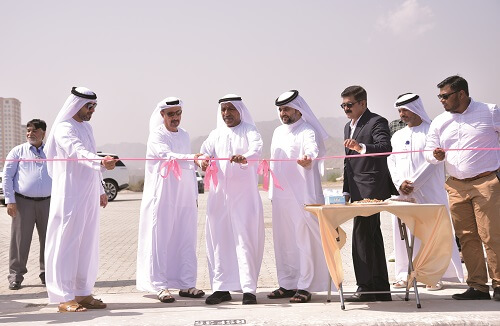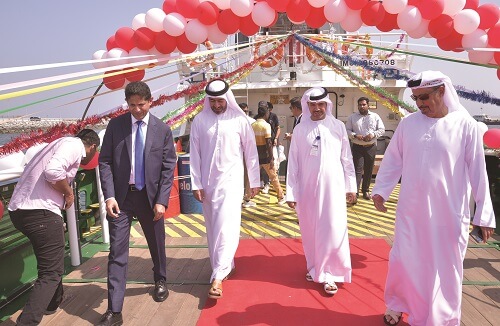Middle East Fuji President & CEO Saeed Al Malik in #Issue83: We are a One Stop Station for All Ships’ Services
Middle East Fuji, a leading marine supplier of ship provisions and various types of spare parts, maintenance and operational services, is keeping up with the market’s developments and technologies as a strategy to meet new sectors’ requirements, including the railway and the industrial sector in terms of construction, #oil and #gas production.
The company’s President & CEO Saeed Al Malik, told us about Middle East Fuji, the company that celebrates 30 years in the marine supply business in 2023, with a premium goal to be a one-stop station with for services.
Al Malik, Former Vice Chairman of Maritime Advisory Council, Former member of Trustees Emirates Maritime Arbitration Centre, also Chairman of the International Ship Suppliers & Services Association (ISSA) since 2018, being the first Arab to head the association, and president of the UAE National Ship Suppliers Association (UNSSA) highlighted ISSA’s effective role in the maritime and industrial sectors while following development plans and protecting the interests of ship suppliers.
As President and CEO of Middle East Fuji, what can you tell us about this journey?
We are in our 30th year in this business since 1993. We collaborated with Fuji Limited in 1998 to cover the Middle East area through our offices in the region, and I sold some of my shares to Fuji Limited in order to merge the two companies, since Fuji Limited is a large global company present around the world covering East Asia, Europe and North America.
The company that I have founded later became Middle East Fuji, established in Dubai. After that, we expanded in the United Arab Emirates, Oman, Qatar, Saudi Arabia, Northeast Africa and Djibouti. The company started out with 15 employees at the time, whereas today the number of employees is 290, as it offers ship agency services, and various ship supplies, from A to Z.
This has been Middle East Fuji’s main goal all along, to be a one-stop-station providing all services, which also includes dry dock services, since we are a link between the dry dock and the Federal Transport Authority Land & Maritime FTA. This is in addition to shipbuilding services, as we offer our aid in this process through our connections with shipyard operators. We have also expanded into other fields like general trade, i.e. import and export from UAE to East Asia and Africa.
We also worked on offshore projects as we have a clear understanding of what ships and offshore platforms need. This is in addition to our business in heavy industries, where we represent many international companies, with the help of a team of 55 people, including 30 construction engineers.
What are Middle East Fuji’s plans over the next three years?
The Middle East region is constantly evolving with an increasing population, demanding more projects and services, and in that aspect, we have plans to renovate our ideas. The action plan that we have set for the region during the next three years is to keep pace with the market’s developments and requirements in other sectors, mainly the railway and the industrial sector, with plans to develop it in terms of construction projects and the production of oil and gas, all in line with the maritime sector’s developments.
In 2023, the company celebrates 30 years in the field. How do you summarize this journey and what are your prospects of the future?
We see a bright future for the company, as we are in continuous success, and there is no doubt that following market’s developments and conducting the necessary studies, in addition to a good management and adopting digital solutions (30% of our systems use artificial intelligence) would contribute to our positive outlook towards the development and expansion of our services.
There is a continuous development meant for our company and the private sector companies, which I believe will continue to succeed if they work in the right way.
Recently, IMO has issued many regulations addressed to shipowners, mostly related to decarbonisation, and fuel. How do you view these measures and their impact?
Discussions regarding these matters are still taking place among the different maritime sectors, such as ports, shipyards, shipowners, and service providers. As for IMO’s environmental legislation, we see that there are some flaws in the development of regulations that lack experience in the details of the maritime sectors; however, we still need them.
Similarly, we have some notes regarding the declaration of dangerous goods, which includes some chapters that place responsibilities upon service providers that are not within the scope of their work. Therefore, we seek, through the IMO’s working team, to make some adjustments regarding the obligations that we make before providing our services.
You are the first Arab to head the International Ship Suppliers & Services Association (ISSA). How do you see this responsibility?
It is certainly very time consuming, to follow up on the weekly calls with the office in the UK. Our role in the association is quite beneficial for all 2000 members around the world; with 40 countries as members. This association, registered in The Hague, Netherlands since 1955, aims to protect the interests of ship suppliers, and its primary responsibility is to protect the welfares of ship suppliers that share a relationship with several other institutions, such as the private sector companies that manage ports, which mainly affect the speed of providing services without having the required experience. As a third party, we are specialized in supplying provisions, and every other thing that the ship needs.
Some ports might request providing supplies directly through their agents, which we think is a problem considering the agent’s lack of experience in this field. This results in some delays while trying to finalize matters on time, especially when it comes to container ships. On the other hand, the cost of calling at a port increases due to these procedures, and as a result, ships head to other areas to finalize their matters. What we are working on now is to tackle this problem with local and foreign ports.
One of the Association’s main objectives is to coordinate with the World Customs Organization, the International Chamber of Commerce, and the International Maritime Organization concerning tax procedures. Since we are a considered a company that provides re-exportation services, one of the difficulties is the problem of value added taxes laws, which does not apply to ship suppliers. In this regard, we are working with UAE’s Federal Tax Authority to reach an understanding, while a private office in Europe and UK is handling this matter with the tax authorities internationally.
Dubai has been referred to as a maritime hub lately, successively winning IMO council membership. How do you see Dubai with its leading position among global maritime clusters?
DP World has made great developments in the region in terms of acquiring foreign ports, which in return have placed the UAE on the global map as a logistics hub. As for other regions such as Ras Al-Khaimah and Sharjah, which are in their development phases, our role here is to help ports by providing services and supplying ships with medicines and food supplies. Sometimes, the Federal Transport Authority Land & Maritime requires us to deal with agents to provide our services, which may cause some problems with the agent and increase time and costs. So our procedures aim to correct the course of communication between service suppliers, ports and agents.
Robban Assafina Magazine, Issue 83, Jan./ Feb. 2023, Maritime Host, pg. 95
| Read Here | |
 |
|





































